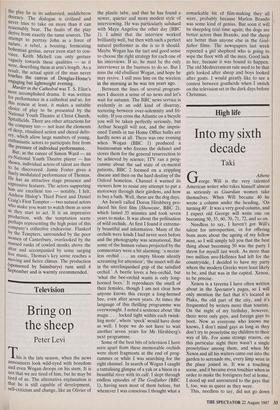Television
Bring on the sheep
Peter Levi
This is the late season, when the news announcers look wild-eyed with boredom and even Wogan droops on his stem. It is not that we are tired of him, but he may be tired of us. The alternative explanation is that he is still capable of development, self-criticism and change, like an Olivier of the plastic tube, and that he has found a newer, quieter and more modest style of interviewing. He was particularly subdued with Maya Angelou the other day (BBC 1). I admit that the interview worked brilliantly well, but then with such a perfect natural performer as she is so it should. Maybe Wogan has the tact and good sense to choose the right strategy for each one of his interviews. If so, he must be the only interviewer in the business to do so. But I miss the old ebullient Wogan, and hope he may revive. I still miss him on the wireless in the morning as he was ten years ago.
Between the lines of several program- mes I discern a sense of no news and let's wait for autumn. The BBC news service is evidently in an odd kind of disarray, teetering between over-solemnity and fri- volity. If you cross the Atlantic on a bicycle you will be taken perfectly seriously, but Arthur Scargill will not, and the impris- oned Tamils in tne Home Office hulks are hardly news at all. There was one evening when Wogan (BBC 1) produced a businessman who freezes the defunct and stores them for the general resurrection to be achieved by science; ITV ran a prog- ramme about the sad state of ex-mental patients, BBC 2 focused on a crippling disease and then on the hard destiny of the Oxford homeless. Channel 4 warned its viewers how to resist any attempt to put a motorway through their gardens, and how to buy a bath. Well, these are the dog days.
An Israeli called Doron Hirshberg pro- duced his first film (Showcase, BBC 2), which lasted 35 minutes and took seven years to make. It was about the pollination of wild orchids. At first I found it extreme- ly beautiful and informative. Many of the orchids were kinds I had never seen before and the photography was sensational. But some of the human values projected by the commentary were a bit alarming: 'a nectar- less orchid . . . an empty bloom silently screaming for attention'; 'the insect will die in the unrelinquished grip of the satisfied orchid.' A beetle loves a bee-orchid, but 'what the bee-orchid wants is only long- horned bees.' It reproduces the smell of their females, though I am not clear how anyone knows this except a long-horned bee, even after seven years. At times the language of this thrilling programme was overwrought. I noted a sentence about 'the magic . . locked tight within each twink- ling mote', where 'speck' would have done as well. I hope we do not have to wait another' seven years for Mr Hirshberg's next programme.
Some of the best bits of television I have seen apart from these memorable orchids were short fragments at the end of prog- rammes or while I was searching for the right channel. In search of Wogan I caught a tantalising glimpse of a yak or a bison in a beautiful river with its calf. I slept through endless episodes of The Godfather (BBC 1), having seen most of them before, but whenever I was conscious I thought what a remarkable bit of film-making they all were, probably because Marlon Brando was some kind of genius. But soon it will be sheepdog trial time again; the dogs are better actors than Brando, and the sheep are better than anyone else in the God- father films. The newspapers last week reported a girl shepherd who is going to wipe the floor with all the men. Good luck to her, because it was bound to happen. The old Mediterranean rule used to be that girls looked after sheep and boys looked after goats. I would greatly like to see a contest between goatherds when I switch on the television set in the dark days before Christmas.










































 Previous page
Previous page